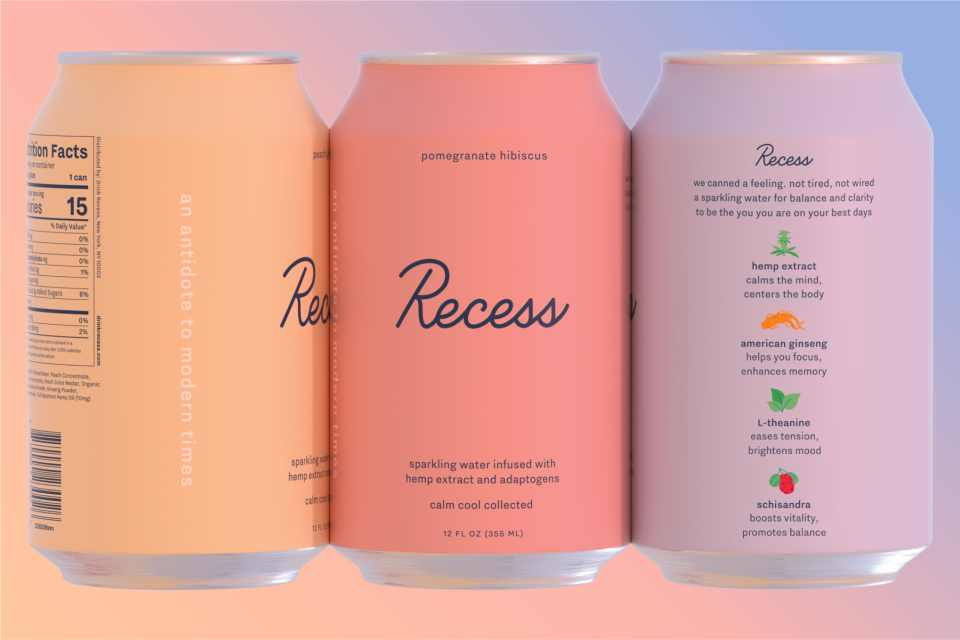CBD beverage founder: 'I want to be regulated'
Not nearly enough legislative ink has been spilled over the booming CBD industry, according to Benjamin Witte.
“I’m calling for regulation, like, I want to be regulated,” Witte said during an interview during Yahoo Finance’s monthly Breakouts series. “I think the biggest risk to Recess is kind of bad actors.”
Witte is CEO and founder of Recess, a CBD (cannabidiol) and adaptogens-infused sparkling water brand based in New York. The one-year-old company has raised $6 million in seed funding from as-yet undisclosed investors, and its sunset-colored cans are available in thousands of retail locations on the East Coast and in California. It amassed a backlog of 5,000 orders and did 40 times projected sales in its first month, Witte said (although further financial details haven’t been disclosed).
But Recess’s quick surge to consumer packaged goods success hasn’t been without its roadblocks, with many of these coming as a result of regulatory issues. Recently, Recess had to shift its manufacturing from New York’s Hudson Valley out-of-state and “lay off a bunch of people up there,” Witte said.
“It’s an example of the lack of kind of regulatory clarity, very much hampering the industry and forcing us to be very nimble,” Witte said.
But more – not less – oversight will ultimately enable the CBD industry to grow, Witte believes.

“CBD right now, it's kind of this mania. I think it has similar dynamics to the cryptocurrency mania where there's this kind of Gold Rush and everyone's trying to start the 2,000th CBD oil company, or there's a new beverage launching every single day,” he said. “And a lot of the people, you know, frankly, launching these companies, don't recognize how challenging it is to create high quality products that are compliant, and so they take shortcuts.”
“And so when I talk about the regulation being required, I think it's to ensure that the products that are out there are very high quality,” he added.
The CBD in Recess doesn’t get users high and is derived from hemp, which contains 0.3% or less of tetrahydrocannabinol (THC) and was removed from the Drug Enforcement Agency’s Schedule I classification as part of the Hemp Farm Bill in December 2018. The Food and Drug Administration still considers CBD added to food products to be federally illegal. And while myriad companies and enthusiasts have touted CBD as a solution for everything from anxiety to muscle pain, the science around its efficacy in small doses in consumer products remains inconclusive.
Recess uses 10 milligrams of broad-spectrum hemp extract in each of its 12-ounce cans.
‘It’s actually nowhere’
Witte’s demands for regulation echo those of public cannabis company CEOs, many of whom have cited the black market as a risk to the industry for pulling their customers and undermining the credibility of those who’ve abided by existing legislation. When these leaders call for more regulation, they’re calling for more clarity – for their own operations, consumers and businesses they work with as distributors, retailers and financial service providers.
That cause has been a point of both personal and business interest for Witte. He’s on the Hemp Roundtable, a lobbying group that, among other things, helped push for the SAFE Banking Act to pass the House of Representatives in September. If enacted into law, the bill would prohibit regulators from penalizing financial institutions from providing banking services to marijuana-related businesses.
The fuzziness around the legality of CBD has kept a host of companies from Coca-Cola (KO) to Pepsi (PEP) away from the stuff for now – although Witte maintains he’s had conversations with most of the major players in the beverage space, and that they’re all interested in getting in once regulatory opacity clears.
“What I like to say is, like, it feels like CBD is everywhere, but it’s actually nowhere, because it’s not in the national retailers yet,” Witte said.
But the legal yellow light for CBD so far has also given Recess an inroad to grow before the opportunity unlocks on a larger scale.
“It's actually because of the regulatory uncertainty, none of the big guys – Pepsi, Coca Cola, Nestle – were going to get into it,” Witte said. “It gave us this kind of window to build this brand.”
—
Emily McCormick is a reporter for Yahoo Finance. Follow her on Twitter: @emily_mcck
Read more from Emily:
FedEx CEO: ‘Whistling past the graveyard’ on the U.S. consumer belies a broader slowdown
There won’t be ‘billion-dollar beverage brands’ in the future: Iris Nova CEO
Tech companies like Lyft want your money – not ‘your opinion’
Follow Yahoo Finance on Twitter, Facebook, Instagram, Flipboard, LinkedIn, and reddit.
Find live stock market quotes and the latest business and finance news

 Yahoo Finance
Yahoo Finance 